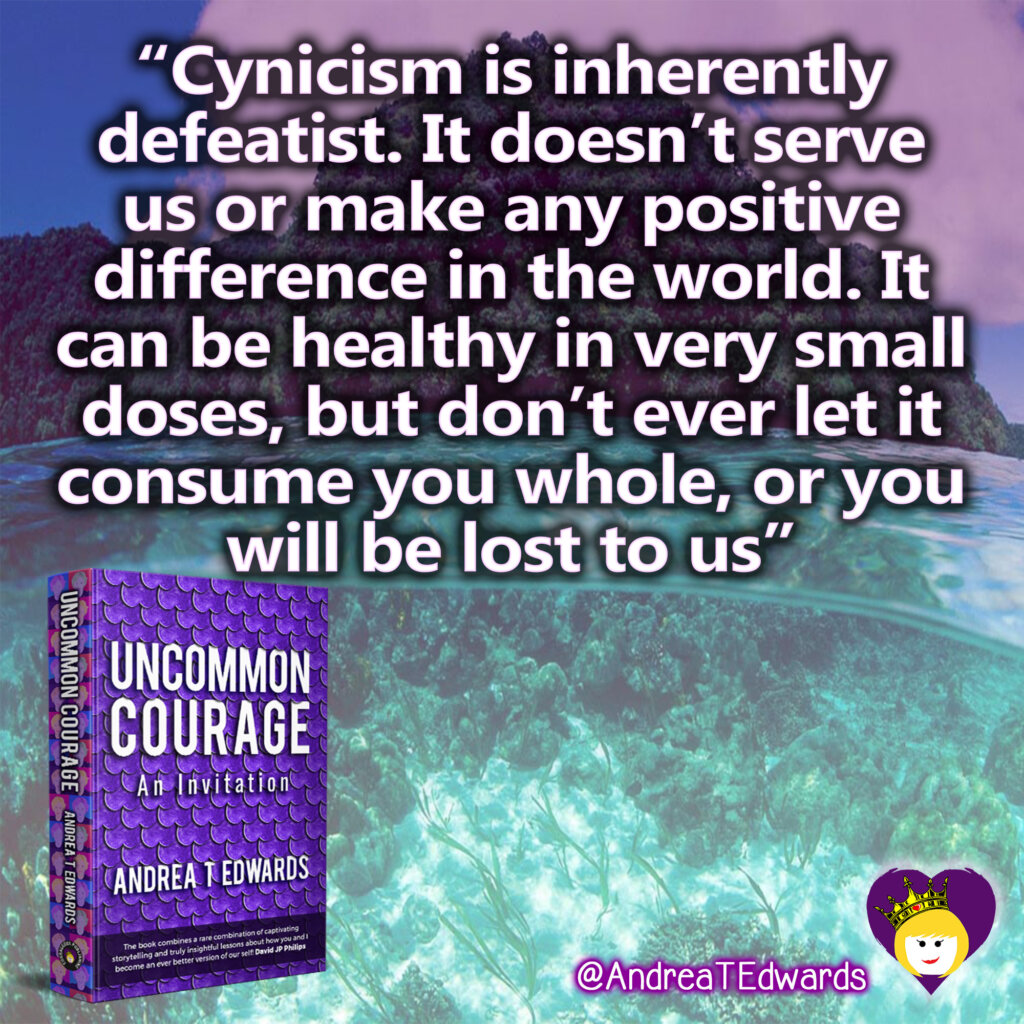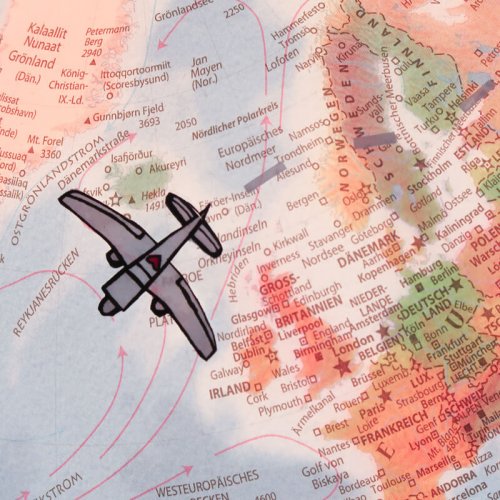This blog is an adaptation from the podcast Uncommon Courage, which is hosted conversations, created by author, speaker and The Digital Conversationalist, Andrea T. Edwards. Uncommon Courage features an array of guests each week and focuses on how we can come together to create the future we want for humanity.
If you prefer to listen, this podcast can be found here on Apple, and here on Spotify, plus where all podcasts are published.
This is the third in the series. You can find the first two blogs here
- 22 lifestyle changes you can make to contribute to a better world installment one: a focus on food
- 22 lifestyle changes you can make which contribute to a better world, installment two: navigating our plastic problem
If you’re wrestling with the question: “What can I do to contribute to alleviating the climate crisis?” We have good news. The answer is—a lot. In fact, there’s so much we can do, this series of blogs will help you decide on the contribution you can make, and is packed with fast facts and actionable advice.
Spoiler alert: The thesis of this series is that if the vast majority of us—meaning you, your family, friends and neighbors—do some very basic things better, we can make a huge difference.
Contributing to this post is a team of four passionate planet protectors. Susanna Hasenoehrl, better known as The Sustainability Speaker, who helps corporate leaders identify sustainability risks and realise opportunities to future-proof business amidst imminent ESG-challenges. Michelle Mouille, Founder of Sustainable Maikhao Foundation, has a long history of supporting green initiatives on the idyllic island of Phuket. Tim Wade is a motivational and business growth speaker who helps clients lead change, motivate staff, and develop leadership capability. And Andrea Edwards the author of Uncommon Courage and an evangelist for social leadership, content strategy, and employee advocacy through her brand The Digital Conversationalist.
Together, the fab four came up with 22 Lifestyle Changes we can all make to contribute to a better world. So, if you only do ONE thing, make it the fact that you share this list!
In our third installment, the focus is on what we can do to get people talking about climate action and how to travel more mindfully once our beautiful blue skies open up again.
Here are some fast facts if you need a compelling reason to keep reading:
- In 1960, 100 million passengers traveled by air. By 2017, the total annual world-wide passenger count was four billion. Pre-pandemic, the IATA Forecast Predicts 8.2 billion Air Travelers in 2037
- In January 2021, Atmospheric Environment concluded aviation’s climate impact accounted for 3.5 percent of total anthropogenic warming in 2011 and was likely the same percentage in 2018. Why not higher? Because all other emissions categories are growing at the same rate. You can get more emissions statistics here
- The challenge is, if we go back to what we left behind, and keep growing at the rate we were growing, we’re not going to maintain this, right? Divers Find Rebounding Marine Life Around Reopened Phuket. It took less than two years for this rebound, we can achieve great change in nature in a short time!
- The Nielsen Global Trust in Advertising Report 2020 confirms a decades-long trend with results showing that 83% of online respondents in 60 countries say they trust the recommendations of friends and family more than other sources. Your voice matters!
Because your voice matters, Tip #21—Be a Ripple Maker is a collective tip from all four of our contributors about the power of your voice. If you follow Andrea online, you may have seen her ripple-maker video about creating movement toward change through our individual actions.
How do we make ripples? Each time we share reliable information, start a dialogue, make a decision or model a way of life that has a positive impact on the planet, we are creating ripples of change. To drive the volume of change our planet so desperately needs, we need each of us to make as many ripples as we can. To help you along the way, we have grouped some ripple-making ideas from the team below under three categories:
Create, share or attend eco events designed to get people talking. To spread awareness en-masse, it’s critical that eco events are engaging as well as helpful. While it’s always great to have eco warriors out in force, we need to reach beyond those already aligned and bring new advocates into the fold.
Phuket, for instance, has combined beach clean ups with yoga and boot camp-style workouts—and even free language lessons to generate climate awareness within the local community. In Singapore, events like Coastal Cleanup Singapore allow you to pay for kayak rentals in rubbish that you collect from the bay as you paddle. For more tips, Environment.com shares six additional ways to raise awareness in its post here.
Influence your own community. When considering how to get influential people we know and our friends and family talking about climate action, we can take matters into our own hands and homes by hosting a conversation-starting dinner party. This idea, shared by Tim, was inspired by a quote from the book Feed the Resistance, Recipes and Ideas for Getting Involved:
“Community building requires the collective movement of the community. And we must all be engaged in setting the table that we hope to sit at, we have plenty of work to do, and we intend to be well fed while doing it.”
Tim suggests inviting your friends around for a plant-based meal without tipping your hat about the contents of the menu in advance. As everyone tucks into dinner, you can lead the conversation towards sustainability with questions like: What do you think about the impact of our diet on the planet? If you don’t want to focus on meat consumption, you can always talk about compost or food waste and rescue. You can even go a step further and hand out some recipe cards for planet-friendly meals.
Bring your personal passions to work. All our panelists are evangelists for workplace sustainability and together they recommend taking your climate advocacy to work. Climate conversations can be an opportunity to make immediate and lasting connections with people who share your passion for the planet.
Asia, in particular, is finding itself under the microscope as parent companies or subsidiaries in climate-action countries reach out to ask what their counterparts in Asia are doing to help the planet. So the next time the opportunity presents itself, be the person to ask, “How does this affect our carbon footprint?”.
To ensure you garner immediate support, Andrea’s suggests securing executive sponsorship. There will be somebody in your organization at a senior level that gets it, who understands the problem, and will be happy to support a group of employees that want to move forward. It’s often up to us to initiate further research and contemplation into how our workplaces are affecting the world.
Workplace efforts are critical, because corporate-level action has an immediate and significant impact. It can also be good self-promotion! Taking the lead on climate initiatives can increase your visibility in the workplace, garnering you a lot of attention across a lot of different influencers within your organization, which can increase your chance of getting a promotion and pay rise. Great tip from Tim, who runs a course on getting promoted.
If your company is ready to commit to change, Susanna can help identify ways your company can make a difference. You can reach her through her Website too.
We know that now is the time. Not too long ago Deloitte announced it is sending roughly 330,000 of their people for training on climate change. Here’s the article! Experience says that if the big consulting firms are seeing a massive need for this, it’s a great time to get a seat at the table.
If you have stuck with us through all three of these blogs, well done! You have made it to the last tip: #22—Travel Mindfully. Most of us are waiting with bated breath for the skies to open again and travel restrictions to be lifted, but our absence from the roads, rails, ships and skies has had an astoundingly restorative impact on our planet.
If you haven’t watched David Attenborough’s latest documentary The Year Earth Changed on Apple+, give it a go, you will be happy that you did. Hopefully, it will also give you a moment’s pause before you plan your next trip, because one of the best ways to move forward is by moving less. Now we know we can Zoom into that meeting rather than fly, but will we?
Since the early 2000’s, we have been obsessed with the skies, crisscrossing the globe on more than two billion flights and each year it has grown significantly. In 1960, 100 million passengers traveled by air. By 2017, the total annual world-wide passenger count was four billion. Read that one again—100 million to four billion. But as we shared above, it’s expected to hit 8.2 billion by 2037!
In another report EESI.org states, “In their annual forecasts, aircraft manufacturers Boeing and Airbus project an average global passenger traffic growth rate of approximately 4.5 percent per annum through 2038. At that rate, air passenger traffic will double by 2035, and double again by mid-century.”
This supports the IATA growth predictions already shared, but we’re also looking at 16.4 billion by 2050? Big numbers, right? Big emissions. Lots of tourists. Lots of nature being trampled on and degraded. We don’t want that, do we?
No question, the growth is astronomical, and the majority of it is slated to come from China, Thailand, Indonesia and other countries with a growing middle class. That said, business travel is always the biggest factor. We’re now used to having these conversations online, and we need to keep that up because Airbus will not be launching its emissions free plane before 2035 and the planes sold in the last two years will emit one billions tons of CO2 in their lifetime.
We need to all live and work smaller. Yes, hard to accept, but this is what we are looking at.
Here’s a nice tip. Expats, for example, can shift their focus to exploring the part of the world they are living in rather than zig-zagging around the globe, visiting their home country when away for short periods of time.
Or we can all travel for longer, off-set while it’s still meaningful, support genuinely sustainable businesses, and contribute positively to where we visit.
Another example – rather than booking that boat with the thousands of other tourists trashing the ocean and the land, join a sustainability boat trip which is planting seagrass, mangroves, or releasing endangered species back into the ocean? Here’s Oceans for All Foundation in Phuket for your next visit. There are so many things we can do!! Look out for sustainable adventures and make your holiday count.
Mindful travel isn’t limited to planes, what we do in our cars matters too. If you can get by with one less car, then do. If you can carpool to work or school, please do. If you have to go shopping, or you need to get something in town, try to plan all your errands in an area at the same time, so your trip to town is a multitasking masterclass.
The fab four implore us all to take this time, before our pent up desire to travel is unleashed, to be really clear on our values and make travel decisions before they become emotional ones. Let’s all commit to travelling less and for longer, take more trains, rent electric vehicles, and always offset.
The next move is yours.
So many people think that the everyday person can not make an impact on climate change. You can. We can. Everything we do makes an impact—yes, even using one less straw. So channel your inner Obama, understand the value of what you are doing and know that “Yes we can!”
You are an important piece in the overall puzzle that is our future.
So! Your challenge—should you choose to accept it—is to choose one or two or three ideas from the 22 suggested in this blog series and implement one of them this week. Once you’ve implemented that idea and it’s working for you, then implement the next one. Just start. Only with action will the change we so desperately need happen.
So will you do it? Will you be a ripple maker with us? You can start by sharing this blog right now.
Cheers
Andrea, Tim, Susanna and Michelle
Special thanks to Sam Gayfer for listening to our podcast and pulling these three articles together. Her business is Duckfeet Communications and she’s awesome!
Uncommon Courage – my new book – is available
You can buy it on Amazon, Apple Books, Barnes & Noble, Book Depository, Booktopia, Smashwords, Kobo, Gardners, Odilo and Scribd.
Do check out my new Website uncommon-courage.com.
Come and join the conversation in my new Facebook Group Uncommon Courage.

Connect with me
Website, LinkedIn, Twitter, Facebook, YouTube, Instagram, Medium, SlideShare, Amazon.
The Know Show
Check out The Know Show. It’s new and a weekly wrap up of the news!
18 Steps to an All-Star LinkedIn Profile
Listed by Book Authority in the 100 Best LinkedIn Books of All Time and 22 Best New LinkedIn eBooks To Read In 2021 categories. Grab it today if you want to take your professional presence to the next level! When it comes to LinkedIn, it really is time to ask — can you really afford not to have this book in the hands of every employee?
Feedback
Have I done a great job for you? Can you write a reference on my LinkedIn profile or on my Google Business page? If not for me, why not write one for someone else who inspires you or has helped you? Join the #GivingEconomy



